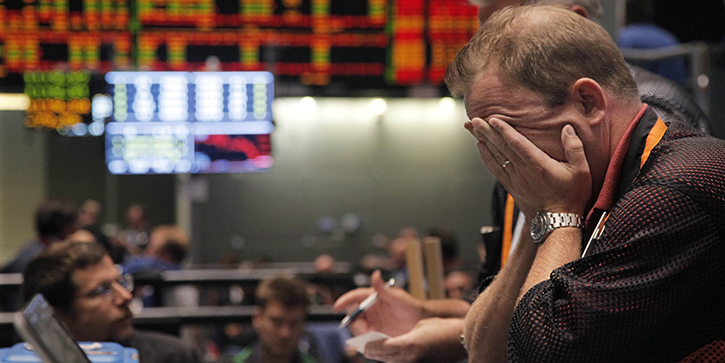
Slow Emotion Replay
-
 Jared Dillian
Jared Dillian
- |
- June 8, 2017
- |
- Comments
First, I want to express annoyance about these feelings. They’re not productive; they don’t help me do my job. They’re a distraction. I wish I didn’t have them.
There are a lot of times in my life where I wish I was just a computer and didn’t have feelings. I’d probably be a much better trader.
And that’s what this piece is about. We’re all human beings, trading and investing, trying to make money, but these things called emotions get in the way.
Now, most trading experts will tell you to get rid of your emotions altogether, to get as close to being a computer as possible.
Let’s be realistic—you can’t get rid of your emotions. The best you can do is to try to use them for your advantage.
Voluble
I am probably more emotional than most people. I have a tendency to get really happy or really angry or really sad (more here). I got a stomach flu a few months ago and spent a day at home on the couch, watching 6 hours of My Cat From Hell reruns (and crying).
I have spent most of the last ten years trying to be as dispassionate as possible—but emotions still sneak out sometimes.
So if I can control my emotions investing, you can, too. One of the first things to work on is your response to making or losing money.
If you get happy when you make money… that is unproductive.
If you get distressed when you lose money… that is also unproductive.
You should instead view that bottom line in the P&L as an input to a math problem. If it is negative, you work on solving a problem: how to make it positive. If it is small, you work on solving a problem: how to make it bigger.
And if it is big, try not to get carried away. It will one day be small.
This too shall pass should be your motto—these feelings you are experiencing are only temporary. It may not seem that way when you are down 20 days in a row, which is why you can’t be passive about losses. You have to take action.
It is human nature to avoid dealing with something that is bothering you: “I’m sure this will go away if I just wait long enough.”
So people don’t log onto the brokerage account, or even open the statements that get mailed home. They sit in a pile.
Like what you're reading?
Get this free newsletter in your inbox every Thursday! Read our privacy policy here.
To sell the position is to acknowledge that you screwed up.
Most people can’t even admit that to themselves.
You know how it is with stocks that go down… they keep going down. So when you ignore a problem, it inevitably gets worse.
The converse is true when someone has a trade that is making money. They get excited, and they find themselves refreshing the P&L every two seconds, and eventually they get really eager to close out the position and realize the gains. I’m sure lots of people bought AMZN in 1997 and sold it in 1998 under the same circumstances.
Oops.
So all of this is a really fancy way of saying:
- Ride your winners
- Cut your losers short
There are a lot of trading philosophers running around on Twitter telling you to do exactly that. But it is easier said than done—because we are emotional human beings.
It is human nature to experience asymmetry with gains and losses—the whole field of behavioral finance is built around this concept.
But not much is written about the actual emotional experience you go through.
I remember distinctly calling one of my old colleagues from Lehman in January 2016, telling him that I just had my biggest day ever. I would go on to have my worst four months ever—starting the very next day.
Not a coincidence.
People Are Crazy
I think most people (and the legal system especially) completely underestimate how emotional and irrational most people are.
Sometimes I walk down the street and look at people and think to myself how everyone is just barely holding it together. Go to a cocktail party—at least half the people there are in some kind of emotional turmoil that they are barely keeping under wraps.
Trading is about being smart, yes, but it is also an exercise in emotional fitness.
Neurotic, sad people generally don’t make money. Happy, confident people are the ones who make money.
Like what you're reading?
Get this free newsletter in your inbox every Thursday! Read our privacy policy here.
I have seen a lot of people succeed and a lot of people fail at investing, and let me tell you, it is not usually a function of intelligence. These dour, bad-stuff-happens-to-me-all-the-time guys really struggle. They struggle mightily. And not coincidentally, bad stuff does happen to them all the time.
People who act like winners usually win. They aren’t always nice guys, but they are winners. Like I said, it is rarely a function of intelligence.
I’m still working on the secret sauce. I’m profitable, but I’m a bit of a grinder. It’s never easy.
Here’s to things being easy.
subscribers@mauldineconomics.com

 Jared Dillian
Jared Dillian
